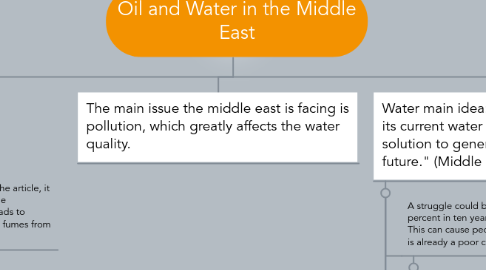
1. Oil main idea: Oil reserves have both advantages and disadvantages.
1.1. A disadvantage would be the pollution caused by the oil plants. In the article, it says, “It is the smell of oil and it is everywhere, rising to the sky at the wellheads, spilling from the tanker trucks that bump up potholed roads to backyard refineries in the Kurdish hills, and again rising to the sky as fumes from their chimneys.” This can be bad for the health of people.
1.1.1. This is what would effect the people. If they're constantly breathing in polluted air, it can affect their health. Also, if one of the tanker trucks is to, crash, for example, and it spills into a water way, and that is a fresh water water way, it'll impact the people very hard.
1.1.1.1. If their health is affected, it can cause them to die from oxygen deprivation.
1.2. An advantage would be money. The article says, “Just eight Arab countries have actually grown rich from energy exports, though some of them spectacularly so: in the tiny emirate of Qatar some 14% of households are dollar millionaires, a higher proportion than in any other country in the world.” Even though only eight countries have grown rich, it’s still being rich from harvesting oil.
1.2.1. This can also affect the people. If people are putting whatever money they have into the oil industry, and it fails, they will too.
1.3. Another disadvantage would be that the oil is unevenly shared. The article says, “The Arab world’s oil is unevenly shared. Saudi Arabia alone holds the most of all reserves.” This is extremely unfair. Someday, someone may get mad about it, and cause a riot.
1.3.1. This is what might affect the region. If the oil and money is unevenly shared, it may cause dispute, and can impact the region in many ways. There could be war, fights, etc...
1.4. A solution for the disadvantages could be decreasing how people rely on oil, and move on to other exports and ways to make money. The oil is slowly creating outweighing disadvantages.
2. The main issue the middle east is facing is pollution, which greatly affects the water quality.
3. Water main idea: "The Middle East has numerous struggles with its current water resources, and the region needs more than one solution to generate an optimistic environmental position for the future." (Middle East-Water Crisis)
3.1. A struggle could be, "The cost of water in Jordan increased thirty percent in ten years, due to a quick shortage of groundwater." This can cause people to not be able to afford water, since Jordan is already a poor country, as talked about in the article.
3.1.1. This can impact people, by them not being able to afford sanitary water to survive.
3.1.1.1. Without sanitary water, people in the middle east can die.
3.2. A majority of the middle east harbors oil giants. "Seventy percent of desalination plants in the world are located in this area, found mostly in Saudi Arabia, the United Arab Emirates, Kuwait, and Bahrain."
3.2.1. This can affect the region because when there are those many oil giants in one area, which we saw on the oil giant map, can greatly affect the area. "The plants harm local wildlife and add pollutants to the region's climate."... "Also, the concentrated salt is often dumped back into oceans where the increased salinity affects the ocean's environment." If the ocean is polluted, you can't fish, swim, or use a boat. It'll highly effect the import and export process that the middle east takes place in.
3.3. "The plants harm local wildlife and add pollutants to the region's climate. In addition, desalination is the most energy-costing water resource. The Pacific Institute explains that the high use of energy results in raised energy prices and higher prices on water produced, hurting the consumer." This affects the people because the people of the middle east don't have that much money, and when prices on a necessity of life is raised by 30%, (water) it'll drain them of the little money they have.
3.4. A solution could only take place if the oil problem is fixed first. Once it is, the water will slowly fix itself. The pollution caused by oil needs to be fixed before the water can.
3.4.1. To connect to this, while the water fixes itself, they can import water from other countries, where fresh water is a surplus and is cheap to buy.
3.4.2. This can only happen if everyone in the middle east contributed. Actually, the whole world, as talked about in previous text boxes.

